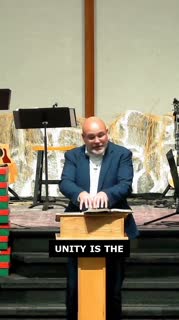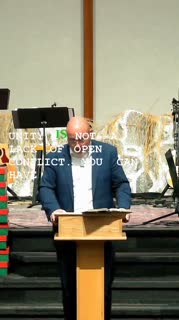Embracing Divine Unity: A Call to Believers
Devotional
Sermon Summary
Bible Study Guide
Sermon Clips
"Behold how good and pleasant it is when brothers dwell in unity. It is like the precious oil on the head running down on the beard of Aaron, running down on the collar of his robes. It is like the dew of Hermon." [00:00:39] (15 seconds)
"Unity is the thing that comes down from the Lord. That's what we're getting at. That's the point. There was a tremendous unity around when Aaron was anointed priest. It brought everybody together." [00:13:04] (12 seconds)
"Unity also came from this understanding of the dew of Hermon. It brings life. It brings hope. And again, it comes from the Lord. The Lord brings life. The Lord brings hope. The Lord is the source of unity." [00:14:17] (14 seconds)
"Unity is not a lack of open conflict. You can have disunity. You can always have disunity when you bring any two people together. Right? It doesn't matter who we are. Any two people, you can have disunity." [00:21:06] (14 seconds)
"But unity happens not when we agree on everything. Don't hear me wrong. Unity doesn't happen just because we agree on everything. You can have unity without agreeing on everything." [00:24:08] (11 seconds)
"The most important unity for us comes in our union with Christ. If we don't have union with Christ, we don't have unity. If we don't have unity with him, none of this other unity really matters all that much." [00:27:31] (13 seconds)
"We maintain unity by nurturing love, and love must be nurtured. Last, we maintain unity by believing the gospel. It may sound obvious, and it should, but I think it's important to say." [00:39:17] (15 seconds)
Ask a question about this sermon
"Unity is the thing that comes down from the Lord. That's what we're getting at. That's the point. There was a tremendous unity around when Aaron was anointed priest. It brought everybody together." [00:13:04] (12 seconds)
"Unity also came from this understanding of the dew of Hermon. It brings life. It brings hope. And again, it comes from the Lord. The Lord brings life. The Lord brings hope. The Lord is the source of unity." [00:14:17] (14 seconds)
"Unity is not a lack of open conflict. You can have disunity. You can always have disunity when you bring any two people together. Right? It doesn't matter who we are. Any two people, you can have disunity." [00:21:06] (14 seconds)
"But unity happens not when we agree on everything. Don't hear me wrong. Unity doesn't happen just because we agree on everything. You can have unity without agreeing on everything." [00:24:08] (11 seconds)
"The most important unity for us comes in our union with Christ. If we don't have union with Christ, we don't have unity. If we don't have unity with him, none of this other unity really matters all that much." [00:27:31] (13 seconds)
"We maintain unity by nurturing love, and love must be nurtured. Last, we maintain unity by believing the gospel. It may sound obvious, and it should, but I think it's important to say." [00:39:17] (15 seconds)














